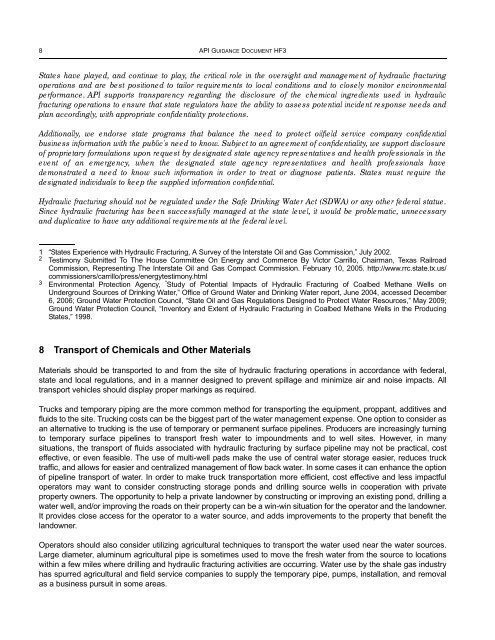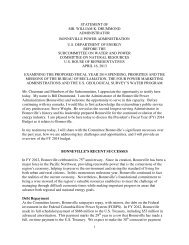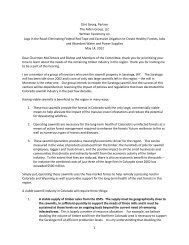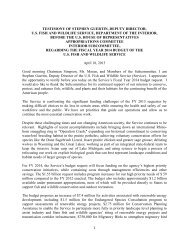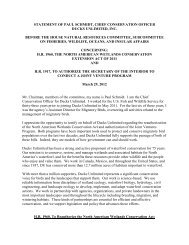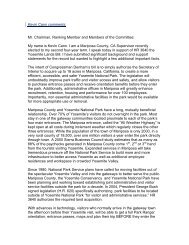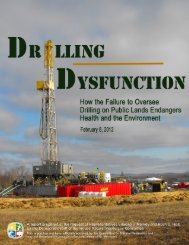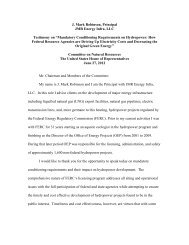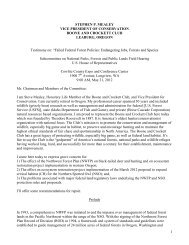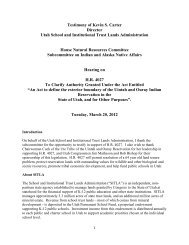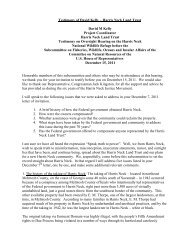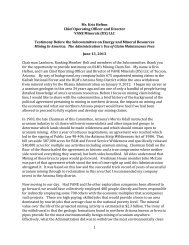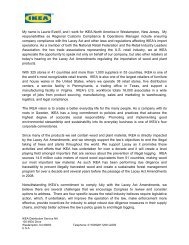Mr. Erik Milito - The House Committee on Natural Resources ...
Mr. Erik Milito - The House Committee on Natural Resources ...
Mr. Erik Milito - The House Committee on Natural Resources ...
You also want an ePaper? Increase the reach of your titles
YUMPU automatically turns print PDFs into web optimized ePapers that Google loves.
8 API GUIDANCE DOCUMENT HF3<br />
States have played, and c<strong>on</strong>tinue to play, the critical role in the oversight and management of hydraulic fracturing<br />
operati<strong>on</strong>s and are best positi<strong>on</strong>ed to tailor requirements to local c<strong>on</strong>diti<strong>on</strong>s and to closely m<strong>on</strong>itor envir<strong>on</strong>mental<br />
performance. API supports transparency regarding the disclosure of the chemical ingredients used in hydraulic<br />
fracturing operati<strong>on</strong>s to ensure that state regulators have the ability to assess potential incident resp<strong>on</strong>se needs and<br />
plan accordingly, with appropriate c<strong>on</strong>fidentiality protecti<strong>on</strong>s.<br />
Additi<strong>on</strong>ally, we endorse state programs that balance the need to protect oilfield service company c<strong>on</strong>fidential<br />
business informati<strong>on</strong> with the public's need to know. Subject to an agreement of c<strong>on</strong>fidentiality, we support disclosure<br />
of proprietary formulati<strong>on</strong>s up<strong>on</strong> request by designated state agency representatives and health professi<strong>on</strong>als in the<br />
event of an emergency, when the designated state agency representatives and health professi<strong>on</strong>als have<br />
dem<strong>on</strong>strated a need to know such informati<strong>on</strong> in order to treat or diagnose patients. States must require the<br />
designated individuals to keep the supplied informati<strong>on</strong> c<strong>on</strong>fidential.<br />
Hydraulic fracturing should not be regulated under the Safe Drinking Water Act (SDWA) or any other federal statue.<br />
Since hydraulic fracturing has been successfully managed at the state level, it would be problematic, unnecessary<br />
and duplicative to have any additi<strong>on</strong>al requirements at the federal level.<br />
1 “States Experience with Hydraulic Fracturing, A Survey of the Interstate Oil and Gas Commissi<strong>on</strong>,” July 2002.<br />
2 Testim<strong>on</strong>y Submitted To <str<strong>on</strong>g>The</str<strong>on</strong>g> <str<strong>on</strong>g>House</str<strong>on</strong>g> <str<strong>on</strong>g>Committee</str<strong>on</strong>g> On Energy and Commerce By Victor Carrillo, Chairman, Texas Railroad<br />
Commissi<strong>on</strong>, Representing <str<strong>on</strong>g>The</str<strong>on</strong>g> Interstate Oil and Gas Compact Commissi<strong>on</strong>. February 10, 2005. http://www.rrc.state.tx.us/<br />
commissi<strong>on</strong>ers/carrillo/press/energytestim<strong>on</strong>y.html<br />
3 Envir<strong>on</strong>mental Protecti<strong>on</strong> Agency, “ Study of Potential Impacts of Hydraulic Fracturing of Coalbed Methane Wells <strong>on</strong><br />
Underground Sources of Drinking Water,” Office of Ground Water and Drinking Water report, June 2004, accessed December<br />
6, 2006; Ground Water Protecti<strong>on</strong> Council, “State Oil and Gas Regulati<strong>on</strong>s Designed to Protect Water <strong>Resources</strong>,” May 2009;<br />
Ground Water Protecti<strong>on</strong> Council, “Inventory and Extent of Hydraulic Fracturing in Coalbed Methane Wells in the Producing<br />
States,” 1998.<br />
8 Transport of Chemicals and Other Materials<br />
Materials should be transported to and from the site of hydraulic fracturing operati<strong>on</strong>s in accordance with federal,<br />
state and local regulati<strong>on</strong>s, and in a manner designed to prevent spillage and minimize air and noise impacts. All<br />
transport vehicles should display proper markings as required.<br />
Trucks and temporary piping are the more comm<strong>on</strong> method for transporting the equipment, proppant, additives and<br />
fluids to the site. Trucking costs can be the biggest part of the water management expense. One opti<strong>on</strong> to c<strong>on</strong>sider as<br />
an alternative to trucking is the use of temporary or permanent surface pipelines. Producers are increasingly turning<br />
to temporary surface pipelines to transport fresh water to impoundments and to well sites. However, in many<br />
situati<strong>on</strong>s, the transport of fluids associated with hydraulic fracturing by surface pipeline may not be practical, cost<br />
effective, or even feasible. <str<strong>on</strong>g>The</str<strong>on</strong>g> use of multi-well pads make the use of central water storage easier, reduces truck<br />
traffic, and allows for easier and centralized management of flow back water. In some cases it can enhance the opti<strong>on</strong><br />
of pipeline transport of water. In order to make truck transportati<strong>on</strong> more efficient, cost effective and less impactful<br />
operators may want to c<strong>on</strong>sider c<strong>on</strong>structing storage p<strong>on</strong>ds and drilling source wells in cooperati<strong>on</strong> with private<br />
property owners. <str<strong>on</strong>g>The</str<strong>on</strong>g> opportunity to help a private landowner by c<strong>on</strong>structing or improving an existing p<strong>on</strong>d, drilling a<br />
water well, and/or improving the roads <strong>on</strong> their property can be a win-win situati<strong>on</strong> for the operator and the landowner.<br />
It provides close access for the operator to a water source, and adds improvements to the property that benefit the<br />
landowner.<br />
Operators should also c<strong>on</strong>sider utilizing agricultural techniques to transport the water used near the water sources.<br />
Large diameter, aluminum agricultural pipe is sometimes used to move the fresh water from the source to locati<strong>on</strong>s<br />
within a few miles where drilling and hydraulic fracturing activities are occurring. Water use by the shale gas industry<br />
has spurred agricultural and field service companies to supply the temporary pipe, pumps, installati<strong>on</strong>, and removal<br />
as a business pursuit in some areas.


